|
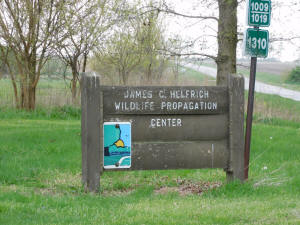 James
C. Helfrich Wildlife Propagation Center hosts free chick day on
Earth Day James
C. Helfrich Wildlife Propagation Center hosts free chick day on
Earth Day
 Send a link to a friend
Send a link to a friend
[April 26, 2023]
Have you ever wondered what goes on at the James C.
Helfrich Wildlife Propagation Center just outside of Lincoln? Well,
on Saturday if you were one of the brave few that went out in the
nasty cold, snowy weather, you had the chance to find out, and leave
with a living example of the work that is done there.
|
|
 The
propagation center was giving away day-old pheasant chicks on
Saturday to anyone who wanted to stop by and pick one. When asked
what one would do with a chick once they had it, Bryan Smith at the
center said that people do pick them up as a pet when they are small
and then will later turn them out into the wild when they are too
big to keep. The
propagation center was giving away day-old pheasant chicks on
Saturday to anyone who wanted to stop by and pick one. When asked
what one would do with a chick once they had it, Bryan Smith at the
center said that people do pick them up as a pet when they are small
and then will later turn them out into the wild when they are too
big to keep.
He said folks are also interested in the female chicks for the eggs.
While those may be reasons for local folk to take advantage of the
free chicks, the real purpose of the center is to provide wild
pheasant chicks that will go to another location to grow up and will
then later be released into the wild in specific areas that are part
of the state hunting program.
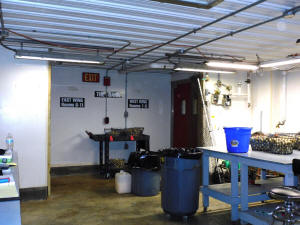
Smith was happy to share the work that is done in
Lincoln, starting with the eggs. In this case, there were several
“barns” of hen and rooster pheasants that were not available for
viewing. The tour therefore began in the sorting and cleaning room
of the center.
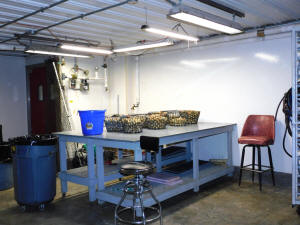
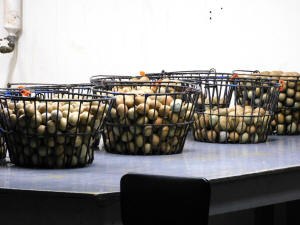
Staff start out by daily collecting the eggs that are laid by the
female or hen pheasants. He explained that eggs are collected,
cleaned then placed in a cooling area. Smith said that chilling the
eggs just a bit will assist staff in culling out the eggs that are
damaged. He said once cooled, the eggs that have hairline cracks in
them will show up better, and those eggs are not placed in the
incubators.
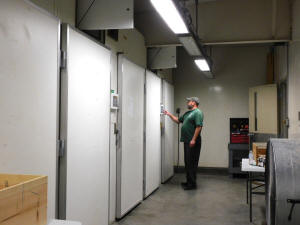
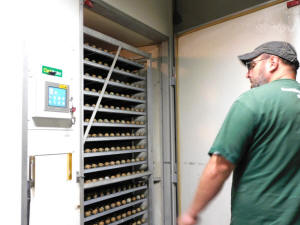
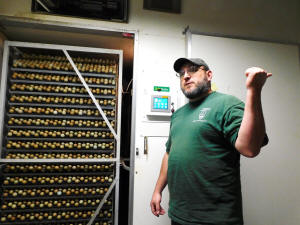
Once eggs are selected for the incubators, the next
step is to place them in those large warm lockers. Smith said there
are thousands of eggs placed in the lockers where they will remain
for 21 days.
The eggs are then moved into similar looking lockers for hatching.
Opening those doors, one can see the eggs, eggs that are broken, and
little chicks making their way out of the shells.
[to top of second column]
 |

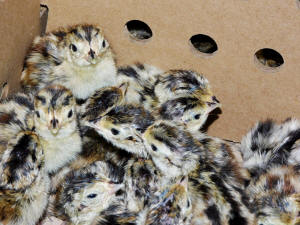
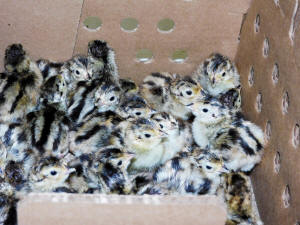
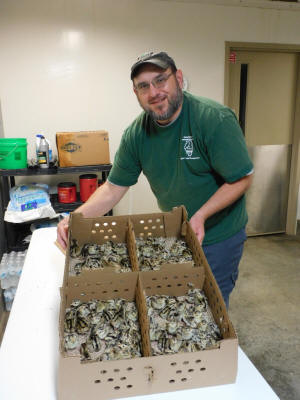
The chicks are then taken from the hatching lockers
and placed in cardboard cartons and returned to yet another
temperature-controlled locker until they are ready to face the world
and be moved out to the brooding houses where they will grow up to
adulthood.
Smith explained that the brooder houses are not nearby. There are
two houses that take the Lincoln chicks. One in DesPlaines and the
other in Mt. Vernon.

When the chicks are fully raised they will then be
sent to state hunting programs including Jim Edgar Panther Creek and
Sandridge State Parks.
In addition, he said that the birds that had been set aside for
Saturday’s giveaway, if not all taken would be given to Kickapoo
Creek Park here in Lincoln. He said the park has a small brooder
house, where they can raise young birds to maturity then those birds
are turned loose at the park.
Asked about the breed of pheasant, Smith said the chicks being
raised are called Ring Neck and are somewhat typical for hunters.
These chicks are descendants of a couple of other breeds including a
Mongolian breed. The roosters used in Lincoln are descendants of the
Mongolian pure breed which like the name implies comes from the
country of Mongolia.
Smith said that the hens are descendants of a standard game farm
breed.
The two breeds are mixed to help incorporate the best of both breeds
into single birds. He said that the Mongolian birds have more of a
wild nature than the game farm hens. The Mongolians are more prone
to flight which means a better hunting experience. The game farm
hens are not as wild, not as prone to flight, but they have a
tendency to be larger, producing more edible meat.

The Propagation Center is considered to be part of
the Madigan State Park, and Smith said he and the staff work both at
the park and the hatchery. He explained how that came about.
In the beginning was Railsplitter Park and Helfrich Wildlife
Propagation Center as two separate entities. When Railsplitter
because Madigan, the state was having difficulty with manning both
facilities. Merging the two, they combined staff duties and made
staff responsible for both.
Consequently, during hatching times, it can be a bit hectic for
staff taking care of both facilities, but they manage.
For those who may be wondering, the hens and roosters are not always
inside buildings. Smith said the facility also has outdoor pens and
in the summer guests can see the adult pheasants in the runs.
If you would like to visit the center, call ahead at (217) 732-1552.
[Nila Smith] |